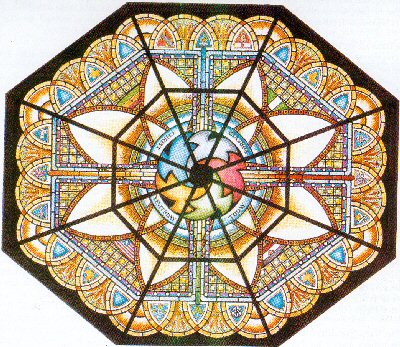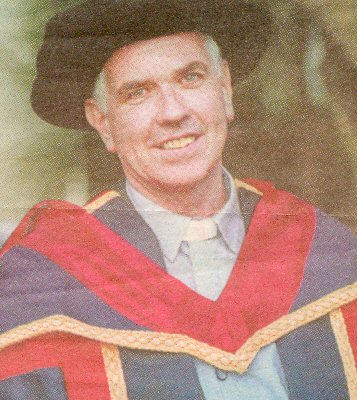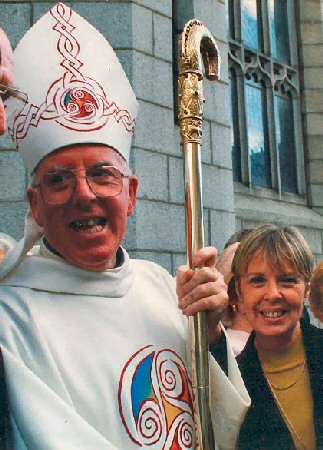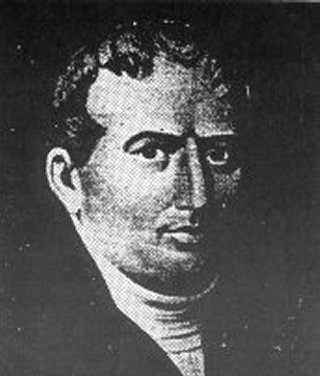Religious History
Historical Articles related to the history of the churches and religious orders in the Newry area
Peter McVerry
The son of the late Dr John McVerry and his wife Eleanor, Peter McVerry was educated at the Abbey primary School and then at Clongowes Wood College. On leaving school he joined the Jesuit Order, secured a science degree at University College Dublin and taught for some years.
He then studied philosophy and theology in the Jesuits’ own school and after his ordination as a priest in 1975 he lived and worked in Summerhill in Dublin’s north inner city. The move to Summerhill was to prove a watershed event. He was galvanised into action to attempt to alleviate the deprivation and disadvantage he witnessed. In 1979 he opened a hostel for young homeless boys aged 12-16 and four years later founded the Arrupe Society to provide care and accommodation for homeless boys. Since then he has opened another three hostels for the homeless and a residential drug detox centre in Co Dublin for homeless drug users.
When he was conferred with an honorary doctorate of philosophy by Dublin City University recently, the President of DCU in his citation said,
‘Few people live to see their name become synonymous with a cause. Peter McVerry is one. For over a quarter of a century he has been a public champion of the young homeless. His is a passionate and tenacious voice for those who lack the clout, the confidence and the means to expose the scandal of young people sleeping rough on the streets of one of Europe’s most thriving capitals.
His ministry focuses on taking care of those whom society would rather forget. He is a vocal conscience prepared to challenge governments, public agencies and an increasingly affluent Irish population.’
Newry Journal is happy to pay tribute to this great man.
In passing we would also like to acknowledge the contribution in a similar field of Newry migrants of past decades such as Sam and Brendan Dowling and especially of Dan Moore. When your editor was in his early youth, he used to marvel at the commitment of this old-time Republican who was prepared to sacrifice several months of his life per year in doing time for the ‘crime’ of carrying the tricolour in the Colour Party of the annual Easter Rising Commemoration in Newry. Few have given a lifetime of service such as Dan – now well into his sixties – continues to do, for to this day he labours all week on behalf of Dublin’s drug addicts.
There must be other Newry greats in the same vein. We would like to pay tribute to them, so please get in contact with us and tell us their stories.
Bishop John McAreavey
John McAreavey was born at Drumnagally, Banbridge on 2 February 1949. He is the son of Mary and the late John McAreavey and has two sisters and two brothers. He received his primary education at Ballyvarley School and then the Abbey Primary School, Newry. He received his secondary education at St Colman’s College, Newry. In September 1966 John entered St Patrick’s College, Maynooth where in 1969 he finished a degree in modern languages and in 1972 a degree in Divinity.
John was ordained as priest for the diocese of Dromore by the late Bishop Eugene O’Doherty on 10 June 1973. Fr McAreavey returned to Maynooth after his ordination and completed a licentiate in Theology in 1974. He was a post-graduate student of Canon Law at the Gregorian University of Rome from 1974-1978 when he graduated with a doctorate in Canon Law.
From 1978-1979 Fr McAreavey was on the teaching staff of St Colman’s College Newry. In the latter year he was appointed to the Armagh Regional Marriage Tribunal. He became head on the death of Fr Mulvenna in 1983 and held this post until 1991. Meanwhile he had been appointed in 1988 Professor of Canon Law in the Pontifical University of Maynooth. While there he wrote widely on Church Law, publishing in 1997 The Canon Law of Marriage and the Family. He had served on the Editorial Board of the Irish Theological Quarterly from 1998. He is also a member of the Canon Law Society of Great Britain and Ireland, and the Canon Law Society of America. Since 1994 he has been secretary of the Greenhills Ecumenical Conference Committee.
Throughout his entire ministry John has been involved in the pastoral care of engaged and married couples. A fluent Gaelic speaker [indeed a polyglot] he is a member of the committee of Col
Bishop O’Neill of Dromore
The Rev Dr Henry O’Neill was 58 years old when he was elevated to Bishopric of Dromore in 1901. He was the third son of John O’Neill of Dromore and had a brother Hugh also a priest. Arthur McCann U.C. J.P. was his brother in law. He entered St Colman’s College in 1857 and shortly after, at the suggestion of Bishop Blake [just featured] went to Maynooth College for further study. In 1867 he was ordained by his predecessor as Bishop of Dromore, Dr Leahy [also featured]. He became President of St Coleman’s, a position he held for a decade. The greater part of the rambling St Coleman’s College of today was built under his stewardship.
In 1886 he was appointed Administrator of Clonallon Parish. There he established a Convent of Mercy – which today acts as a refuge and home for elderly people. The nuns also undertook the education of Warrenpoint’s children.
Throughout his term of office, Bishop O’Neill distinguished himself as an eloquent, zealous and earnest pastor. He was also an esteemed scholar universally admired and respected as a tolerant citizen and a broad-minded, courteous gentleman.
Bishop Michael Blake
Your editor is a huge fan of our present Bishop of Dromore, Dr John McAreavey – a man with the common touch, but also a leader of great piety, erudition, compassion and zeal. But first we want to write a few notes on a number of his predecessors.
Dr Michael Blake – whose virtues have already been extolled on these pages [use Search Engine above!] – served as Bishop of Dromore for almost twenty eight of the mid-nineteenth century years, from 1833-1860. Amongst his legacies to the people of Newry and District are the Bishop’s House and St Colman’s College but far more important, the arrival in Newry of the Christian Brothers and the Mercy Sisters. All of my people have benefited from their devotion to the education of the poor, and there are few Catholics in the district who would not admit the same.
Michael Blake was born in Dublin in 1775 and entered the novitiate of the Irish College in Rome at the age of seventeen. He was ordained in Dublin in 1799. His years of ministry to God were turbulent years and hungry years – including the Great Hunger – and years of continued struggle for Catholics to freely practice their faith. He was parish priest in Dublin for a few years before returning to Rome where he undertook the restoration of the Irish College there. He became Rector of the Umberian College 1826-1829. In 1831 he was transferred as Parish Priest to Westland Row, Dublin. He became keenly aware of the poverty and squalor all around him. He knew also of the work there of the Sisters of Mercy and of the Christian Brothers. The founders of these two Religious Orders, Catherine McCauley and Edmund Rice were his personal friends.
When Dr James Kelly – who had brought the Poor Clares to Newry in 1830 – died in 1833, Michael Blake was appointed to succeed him. He was the first to be consecrated in the Cathedral of SS Patrick & Colman on St Patrick’s Day 1833. His term of office saw the building, re-building or completion of some 25 churches in the diocese and of 16 parochial residences. He set up a Seminary at Violet Hill, still today the site of an excellent Boys Grammar School and of the Bishop’s House that he had built. A devout man he showed intense personal interest in the growth of sodalities and confraternities in his diocese.
Through his direct offices, on 2 Feb 1851 he brought the first Christian Brothers [Br Peter Scannell and Br Vincent McDonnell] to Chapel Street, Newry. As well as a school of learning the Brothers at first provided breakfast for over 100 poor children of the town.
Still not content, he implored the Mercy Sisters to come to Newry. In 1855 his wish was granted. Among the group of first nuns, under Mother Catherine O’Connor of Kinsale, was one local girl, Elizabeth Russell of Killowen. Soon they opened a refuge for down-and-outs and a public laundry in which poor young girls could be provided with a means of support.
A Co-adjutor, John Leahy, was appointed to assist the ageing bishop in 1854. Through his influence the Dominicans [Order of Preachers] were invited to Newry in 1871. The magnificent St Catherine’s Church was soon after built.
Bishop Blake died 6 March 1860 at the age of 85. He had contributed more to the future welfare of generations of Catholic people here than any man before or, possibly since. He rests in St Mary’s Cemetery.
‘Lives of great men all remind us
We must make our lives sublime
And departing, leave behind us
Footprints in the sands of time.’



